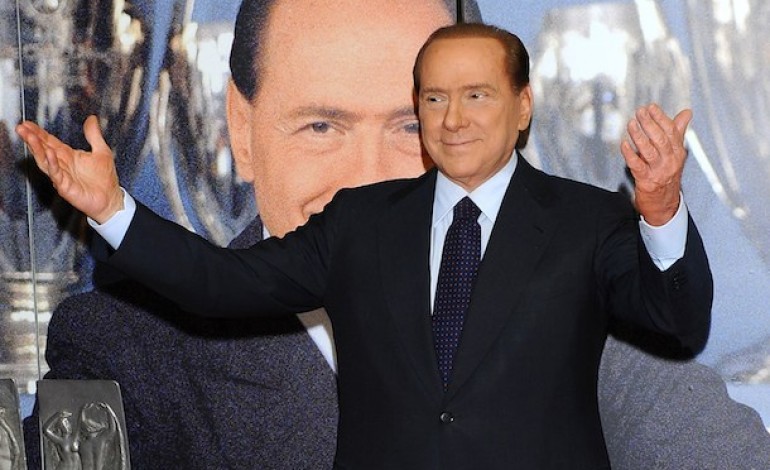
One of the sharpest comparisons for Americans trying to understand the resilient appeal of Donald Trump is the rise of Italy’s Silvio Berlusconi in the 1990s.![]()
Rising from the ashes of a widespread corruption scandal that tarred Italy’s entire political elite, Berlusconi, one of the country’s wealthiest businessmen, rose from 1994’s power vacuum to what would become nearly two decades dominating Italian politics. Though he lost power less than a year after his first election, he stormed back to power in 2001. Despite a short-lived turn in 2006 to the center-left’s Romano Prodi, Berlusconi once again returned in 2008. Forced to resign in 2011 amid a debt crisis, Berlusconi still led the Italian right to what amounts to a draw in the 2013 election.
It’s as if Italian voters just couldn’t help themselves, such was the spectacle of a showman that the Italian media dubbed ‘Il cavaliere,’ the ‘knight.’ Time and again, Berlusconi’s charms proved irresistible. It’s not out of the question that he might mount yet another comeback by the time that the 2018 elections roll around.
The similarities between Trump and Berlusconi — their ‘say it like it is’ populism, their willingness to engage demagoguery, their wealth, their vulgarity, their ability to tap into the emotions (both positive and negative) of their supporters — are manifest.
But there are important differences.
For all of Trump’s bluster, he doesn’t control nearly the share of the American economy that Berlusconi did. For one, Berlusconi’s net worth is nearly $6.5 billion, according to Forbes, about $2 billion wealthier than Trump. But that $6.5 billion punches far stronger in Italy’s economy than Trump’s $4.5 billion wealth punches in the United States, which has the world’s largest economy and a far less insular network of business elites.
Berlusconi, through his media company, Mediaset, controlled six of Italy’s most popular private television channels when he was in power. Now, regardless of whether Trump’s self-branded empire of real estate and other interests impress you, he certainly doesn’t control the American media. Far from it, given his on-again, off-again feud with the right-leaning Fox News and his attacks on other media outlets.
While Trump, like Berlusconi, wants to use libel laws aggressively to chill press freedom, he cannot shape American television media coverage like Berlusconi did in Italy. For all his skills in attracting media attention, Trump still lacks one of the most important tools that explains Berlusconi’s rise to power — and one of the keys that kept him so long at the center of power.
Though both figures are litigious, Trump’s legal troubles over, say, the ill-fated Trump University pale in severity compared to Berlusconi’s personal legal woes. Berlusconi spent much of the 2000s seeking immunity from the Italian parliament from outright prosecution. An early 2003 bill designed to shield the top five government officials from criminal trials, was thrown out by Italy’s constitutional court a year later. A subsequent 2008 effort, targeted to just the top four government officials, was also thrown out by the Italian judiciary, as was an attempt by Italy’s Chamber of Deputies to extend immunity to Berlusconi in 2010.
It’s not an exaggeration to say that Berlusconi’s decade-long battle to shield himself from liability was among his chief parliamentary priorities.
For good reason, perhaps, given the long list of offenses for which he’s been convicted since leaving office in 2012.
Most sensationally, Berlusconi was convicted in 2013 on charges relating to payment to an underage Moroccan prostitute, Karima El Mahroug (sensationally referred to in the Italian media as ‘Ruby Rubacouri’ — Ruby the heartstealer). Though the conviction was overturned by an appeals court in 2014, the wild stories of Berlusconi’s ‘bunga bunga‘ parties may have damaged his reputation more than anything else in what’s still a conservative Catholic country.
More recently, in July 2015, he was convicted of bribery while in office by a court in Naples, though that might yet be reversed on appeal. Berlusconi apparently paid €3 million to Sergio De Gregorio, a member of Italy’s senate, to join the center-right between 2006 and 2008, helping bring down the Prodi government.
Berlusconi was convicted in 2012, a year after leaving the premiership, for tax evasion, and an Italian court in 2013 upheld that verdict, clearing the way for the former prime minister to serve a one-year community service sentence and barring him, temporarily, from holding public office.
Though Trump hasn’t released his tax returns and, in a debate in late February, argued he has been subject to 12 consecutive IRS audits, there’s no indication that he faces criminal charges for tax evasion — or anything else, for that matter.
This site is just awesome. I’ve search these details a great
deal and I realised that is professional, fast to understand.
I congratulate you because of this article that I am going to recommend to people around.
I ask you to recommend the gpa-calculator.co site where each college student or learner can calculate ratings grade point average
rating. Be great!